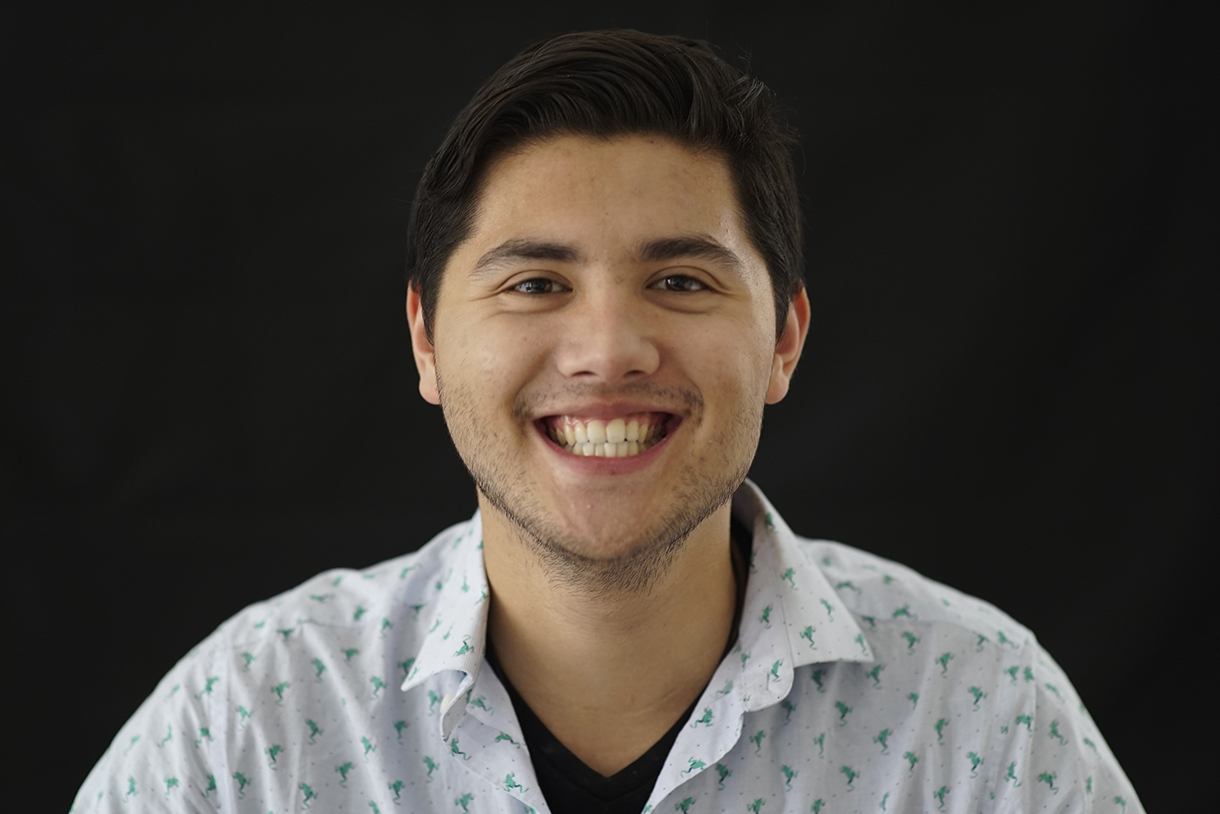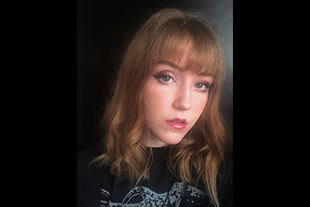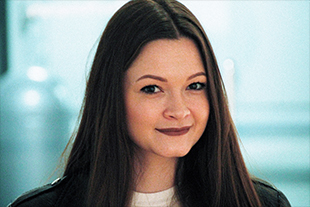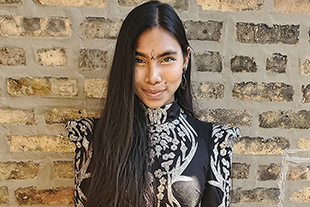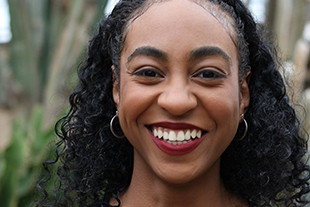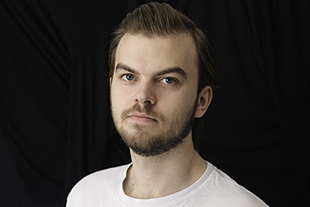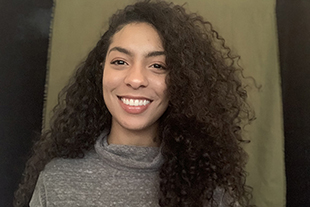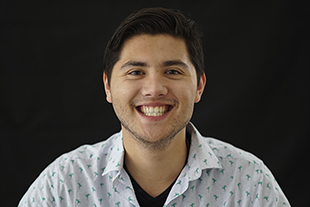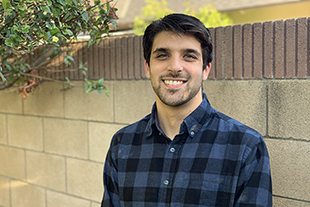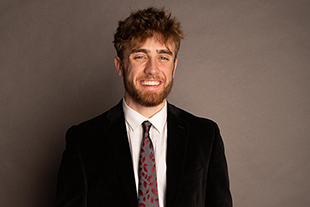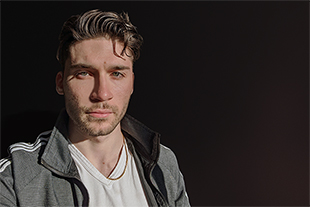Michael Vanbodegom-Smith
Music Composition (BMU)
Michael Vanbodegom-Smith on moving to LA after graduation
What would you say has been the most surprising thing you learned at Columbia?
After four years at Columbia, the thing that still surprises me most is what can happen if you say ‘yes.’ Let’s say someone offers you an opportunity that is a little bit foreign to your general skill set, such as asking you to animate in 3D instead of 2D or play jazz music instead of classical. Instead of saying ‘no, I do not know how to do that,’ go ahead and say ‘yes!’ It might feel like you are falsely advertising your abilities, but the second after you say yes you get straight to work and learn whatever it is that you just agreed to. After you learn it, you keep practicing it until you feel like you have always known it. This mentality opens doors, in terms of getting work and improving your skill set. Out of all the classes I have taken, the one thing that has taught me the most is the sense of urgency and dedication that comes after you say yes to a project. During my first week at Columbia, [for example], I reached out to the animation department asking if I could write music for a project this semester. One of the professors wrote back to me saying, “Are you one of Kubilay’s students? We typically take recommendations from Kubilay.” I remember thinking, “who on earth is Kubilay and what does that have to do with working on an animated project?” It turned out that Kubilay was the director of the MFA program Music Composition for the Screen, and, as a first semester freshman, I didn’t have nearly enough experience compared to the students in the MFA program. I kept trying to obtain more animated work, but after weeks of reaching out to people, I was right back where I started. The turning point was when I started opening my mind to other types of projects.
I began soliciting for work in the University Center, going door to door and seeing if anybody had any need or interest for a composer. Nine out of ten times people would ask why I was knocking on their door and give me a semi-evil glare, but on the rare occasion somebody needed a composer, I made sure to say yes. Over the course of four years I have worked on film scores for all kinds of genres. I apprehensively agreed to write music for a play, followed by a musical. Through the Interactive Arts & Media Department, I was able to score my first video game, which was presented at the Game Developers Conference in San Francisco, and, with the help of a few colleagues, I was able to host my first full-orchestra recording session over at Northwestern University for an animated film.
I came to Columbia as a stubborn classical trumpet player, and after opening my mind to other opportunities and styles of music I found myself on the stage of Buddy Guy’s Legends, the Jazz Showcase, the House of Blues, and the Green Mill as a former classical trumpet player. None of these opportunities happened because I naturally had the ability to do all the tasks required. In fact, I felt like I was in over my head half of the time, but through [what I learned at] Columbia I was able to start collaborating with amazing artists simply because I said yes.
What experiences or courses at Columbia do you feel have been most beneficial?
Having the opportunity to collaborate with others has by far been the best experience I have had at Columbia. These collaborations did not happen automatically. I sent many messages to loads of different people every day, and every Friday I would physically go to one of these buildings and attempt to solicit a collaboration. The experience of putting myself out there has been priceless. I believe it is better to try it now and see what works and what doesn’t work in a school setting, instead of finding it out the hard way post-graduation. Columbia offers an ample amount of talented students and experienced faculty who are willing to work with you if you are willing to go out of your way and break the paradigm. The school itself is willing to work with you so long as you are willing to stand for what you believe. As much as I loved my classes at Columbia, I believed I could have a better learning outcome if I altered the curriculum for my degree, so I did just that.
With the help of my phenomenal academic adviser, Becky Harlow Sass, and the acting chair of the music department, Sebastian Huydts, I was able to alter my degree requirements to make the best of my education. Collaborating with the faculty has taught me a tremendous amount as well. If you work extremely hard and make an effort to connect with your faculty outside of class, they will find work opportunities for you where they can. The Columbia faculty never ceased to amaze me with how eager they were to go the extra mile for an ambitious student. I would communicate with many of my closest professors by cell phone, asking miscellaneous questions here and there, and they would always respond. I was fortunate enough to share the stage and even record trumpet for Columbia faculty, as well as have the faculty record their instruments on my own projects. Columbia students have an excellent opportunity to develop personal connections with their experienced faculty members and creative students, something that would be much harder in a large institution where the classrooms are small auditoriums.
What are your plans for after graduation?
I am joining fellow Columbia Alumni out in Los Angeles this summer. Although plans might be delayed due to COVID-19, I am very excited to start working with the enormous network of filmmakers and musicians in L.A. I do not expect to be working full-time in the industry immediately, I will keep searching for opportunities and making connections until I find myself working triple overtime.
Do you have any advice for current students?
Try to put yourself out there as much as possible. Columbia offers chances to try out different networking strategies and collaborations in a safe environment. Throw something at the wall and see if it sticks, and, if it doesn’t, try something else! As I said earlier, say yes to everything you can. If you are not entirely sure how to complete the task you agreed to, now is the time to find out. If you are struggling to figure it out on your own, there is absolutely no shame in asking a friend or faculty member for help. In fact, work on as many teams as you can. Working with others will teach you a lot about yourself, and you will develop new skills and perspectives. Take advantage of all on-campus jobs and services. The school offers amazing services and clubs, some of which are more obscure than others, which are one-hundred percent free and always available.
Most importantly: keep your head above water at all times. Take care of yourself, mentally and physically, as much as you possibly can. It is too easy to overlook your body's mental and physical needs when you are facing mountains of work, but the quality and efficiency of your work will be [markedly] better if you are healthy. Lastly, enjoy your time in school with an open mind. Everyone has that one Gen Ed (General Education) class that they absolutely dread going to, but, at the end of the day, it takes more effort to actively dislike the class than to enjoy it, so you might as well enjoy it while you can!
